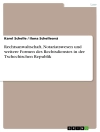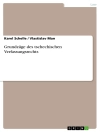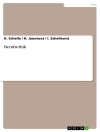In the automotive sector, digitalisation, connectivity and automation are rapidly expanding. In tomorrow’s vehicles, human beings will merely be passengers – which raises a host of complex legal issues regarding accidents involving self-driving vehicles. This book is the first to offer a comprehensive, global overview of civil liability regimes for all levels of vehicle automation in jurisdictions that represent some of the most important markets for the automotive industry. After a technical introduction to how self-driving cars work, the individual chapters analyse the liability for driving automation at SAE J3016 levels 0 through 5 from a country-specific perspective. All chapters were written by experts in the field and follow a uniform legal structure. Hence, the book offers an essential comparative analysis of similarities and differences in the jurisdictions examined, while also providing suggestions for future legislative changes at the national and international level. The book is not only relevant for legal scholars and practitioners but will also be of particular interest to anyone involved in the design, manufacture, distribution and operation of self-driving vehicles.
Table des matières
Hans Steege, Ilaria Amelia Caggiano, Maria Cristina Gaeta and Benjamin von Bodungen, Introduction.- Christian Pek and Sanne van Waveren, Autonomous Vehicles – A Technical Introduction.- Part I – Africa: Jessica Anne Steele and Rakhee Dullabh, South Africa: Motor vehicle collisions liability regime applied to automated vehicles.- Part II – America: Mark A. Geistfeld, Civil Liability for Motor Vehicle Crashes in the United States: From Conventional Vehicles to Autonomous Vehicles.- Juan F. Córdoba-Marentes and Obdulio Velásquez-Posada, Self-driving cars regulation in Colombia.- Part III – Asia: Mingyan Nie and Yuan Shen, Autonomous Driving in China.- Antonios Karaiskos, Autonomous Driving and Civil Liability in Japan.- Thomas Hufnagel and Jaryl Lim Zhi Wei, En-route to a driverless city-state: Examining the current legal landscape for autonomous vehicles in Singapore.- Jeung-Jun Park and Jun-Kyu Ahn, Civil Liability Regime on Autonomous-Driving Vehicle Accident in Korea.- Part IV – Australia: Angelika Yates and Samuel Siskovic, Steering the transition to automated vehicles in Australia – Current status and regulatory changes ahead.- Part V – Europe: Orian Dheu, Jan De Bruyne, Peggy Valcke, Ilse Samoy, Autonomous Vehicles and Civil Liability in Belgium.- Benjamin von Bodungen and Hans Steege, Liability for automated and autonomous driving in Germany.- Lionel Andreu, The law applicable to autonomous cars driving in France.- Angela Fernández Arévalo and Juan Paplo Murga Ferández, Civil liability for damage caused by autonomous vehicles under Spanish law.- Maria Cristina Gaeta, Italian civil liability applicable to self-driving cars.- Eric Tjong Tjin Tai, Civil liability for self-driving cars in Dutch law.- Jörg Zehetner, Merve Cetin and Angelika Holzer, The Civil Liability for Self-driving Cars in Austria.- Vasile Luha, Dr. Bogdan Florea and Silvia Maican, Liability in the case of autonomous cars in Romania.- Anton Olsson and Karl Montelius, Autonomous vehicle andliability in Sweden.- Part VI – The United Kingdom: Felix Boon, Automated vehicle liability in Great Britain.
A propos de l’auteur
Dr. iur. Dr. rer. pol. Hans Steege studied law at the Gottfried Wilhelm Leibniz University of Hannover, where he received a doctorate in law on a liability law topic. He was awarded a doctorate in economics and social sciences from the University of Stuttgart in 2022 on a topic that deals with automated application of the law and its limits using the example of automated/autonomous driving. He worked in the legal department of Continental AG, in public affairs at Volkswagen Commercial Vehicles and has been working in data protection at Cariad SE, a Volkswagen Group Company, since 2021. Hans is a Lecturer at the Institute of Economics and Law at the University of Stuttgart. He is co-editor of the Journal of Digital Economy Law (Zdi W), the Journal of Road Traffic Law (SVR), and author of numerous publications, amongst others in the fields of AI, autonomous driving and the metaverse.
Prof. Ilaria Amelia Caggiano, Ph.D., is Full Professor of Private Law at the Suor Orsola Benincasa University of Naples (IT), where she teaches Private Law and New Technologies Law, and holds the EUGREENEXT Jean Monnet Chair. Since 2021 she is Director of the Master in DPO and Privacy Law. She is Deputy Director of the Research Centre of European Private Law (Re CEPL), specialized in technology and innovation, and of the ‘European Journal of Privacy Law & Technologies’. Fulbright Scholar (2011-12) and visiting researcher in several foreign universities in Europe and America, she is author of monographs and publications in Italian and English on Contract Law, Trust, Privacy, New Technologies and Biotechnologies Law. Her main research areas include, among others, Privacy Law, Comparative Law, and Law of Artificial Intelligence. Her research is characterized by an interdisciplinary approach and comparative perspective.
Dr. Maria Cristina Gaeta, Ph.D., is a Researcher (RTD-A) in Private Law at the Suor Orsola Benincasa University of Naples (IT), with a project on Green Law and Green Mobility, and the Scientific Secretary of the Research Centre in European Private Law (Re CEPL). She is Adjunct Professor of Private law of smart e-mobility and sustainability, and attorney in Naples, with consolidated expertise in new technology law. Maria Cristina was a postdoctoral research fellow at Suor Orsola Benincasa University of Naples (from 2019 to 2021) and holds a Ph.D. in Private Law (summa cum laude and Doctor Europaeus Label – 2019) from Federico II University of Naples. Visiting Scholar and Professor in several foreign universities, she is the author of numerous publications, and the coordinator of the Editorial Board of the ‘European Journal of Privacy Law & Technologies’. Her research interests range from Robotics and Artificial Intelligence, with particular regard to self-driving cars, to Internet of Things and Product Liability.
Prof. Dr. Benjamin von Bodungen is a partner in the Frankfurt office of Bird & Bird LLP and a member of Bird & Bird’s Finance & Financial Regulation Practice Group. He specialises in the transport and logistics sector and offers extensive expertise in cross-border financing transactions, in particular the financing of mobile equipment such as aircraft, rolling stock and vessels. Benjamin is on the board of the Rail Working Group, which is assisting in the implementation of the Luxembourg Rail Protocol to the Cape Town Convention on International Interests in Mobile Equipment. He also advises on national and international transport, traffic and logistics law, with a particular focus on the type-approval, licensing and liability aspects of connected, automated and autonomous vehicles.












